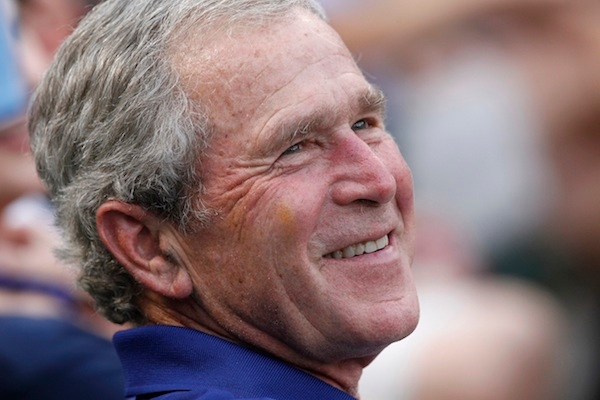Freddy Gray is quite correct: the drive to rehabilitate George W Bush is suspicious. It is also a dog that won’t hunt. It is true that recent opinion polls have reported that Dubya is more popular than when he left office but this is surely chiefly a consequence of the public forgetfulness. Returning to the spotlight can only be bad news for Bush’s reputation. It will remind people why they were so pleased to be rid of him in the first place.
Because, in the end, an administration bookended by the worst terrorist attack in American history and the gravest financial crisis since the Great Depression can’t be spun as much of a success. It just can’t.
True, presidential reputations change over time. Ulysses S Grant, long considered one of the very worst presidents, is in the process of receiving a historians’ makeover. His stock is rising.
There are other ways of measuring Bush’s impact. I wrote about this for today’s Scotsman:
Bush’s presidency proved so disastrous that the American people were persuaded that a young, little-known, inexperienced African-American should succeed Dubya since no-one else could more fully be considered the anti-Dubya. In that respect, Bush enjoys a historic legacy – but it is not the one his defenders have in mind.
And, of course, some of those now pining for Bush are Tea Party types who once despised him but find that they loathe Barack Obama more. The 44th President is not a fiscal conservative, of course, but then he never pretended to be one. His predecessor’s Big Government Conservatism and fiscal incontinence are largely responsible for the fiscal mess in which the United States finds itself. But, hey, that’s what unfunded tax cuts, unfunded expansions of entitlements and a brace of foreign wars will do.
In any case:
Bush slunk from office as he had entered it: quietly. His first months in power were utterly undistinguished. Far from making a mark on Washington, he gave every impression of being little more than a placeholder president keeping the Oval Office warm for the next guy. Osama bin Laden changed that. Bush now found himself plunged into the arena. Awkward though it is to recall this, the rest of the world, already worried by his inexperience in foreign affairs, drew some comfort from the fact that Dubya was surrounded by experienced foreign policy hands such as Dick Cheney, Donald Rumsfeld, Colin Powell and Condoleezza Rice. This callow, incurious president would at least be well advised.
It did not quite turn out that way. When Cheney told the world that the “War on Terror” would often be fought “in the shadows”, we scarcely glimpsed half of what he meant. Securing the “homeland” became the Bush presidency’s chief mission. Bush’s defenders stress his success in thwarting terrorist attacks on American soil. By this reading, Bush should be given a mulligan for 9/11. This, to put it gently, seems generous.
And what followed would define Bush’s legacy:
Extraordinary rendition, Guantanamo Bay and “enhanced interrogation techniques” soiled American policy and destroyed Washington’s moral authority.
The enthusiastic embrace of torture – something with which neither the Republican party nor, more generally, the American people have fully come to terms – is an indelible and shameful stain upon the United States. No amount of spin can wash it away.
[…] Those of us who supported the war must, if we are honest, look back and wonder what we were thinking. It is not quite good enough to argue that we had no idea the post-invasion “planning” would be non-existent or that we expected the Americans to make a better fist of the occupation than proved the case. Removing Saddam remains a prize worth having, but it came at a terrible cost. So much so, in fact, that Bush’s Mesopotamian misadventure rivals the Vietnam War as the greatest American foreign policy blunder since the Second World War.
In that context even Bush’s admirable achievements, notably his work on AIDS prevention, are scarcely sufficient to compensate for his errors.
Even if one wishes to be charitable, the best one can say is that George W Bush was a man over-matched by his office. His second term was largely a matter of trying to correct some of the recklessness of his first four years in office. That too proved an uphill struggle.
Though I didn’t mention it in my Scotsman piece, few things summed up Dubya’s presidency more efficiently than his desire to put his old chum Harriet Miers on the Supreme Court. Here one saw Bushism in miniature: cronyism run amok and the apotheosis of his “trust me, I looked into her soul and found it willing” style of politics. Qualifications be damned. It was a telling moment and one that might have succeeded but for a conservative revolt.
Of course, in comparison with the Iraq disaster – and we can’t flinch from deeming it such – the Miers fiasco was small-ball but it was symptomatic of a Presidency best forgotten and one whose record history will surely continue to judge harshly.







Comments